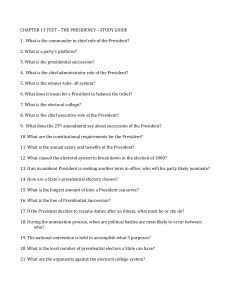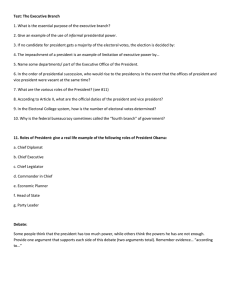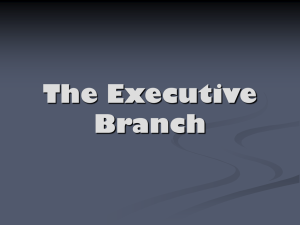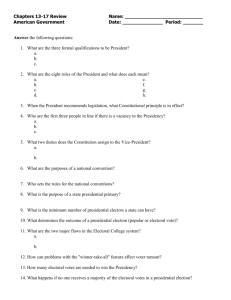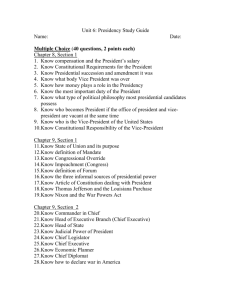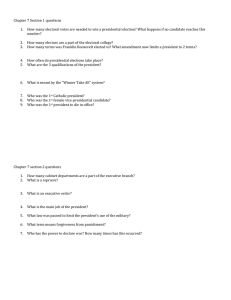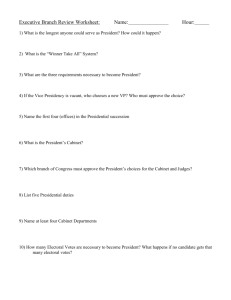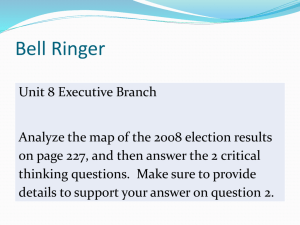Chapter 7.1 (The President and Vice-President)
advertisement
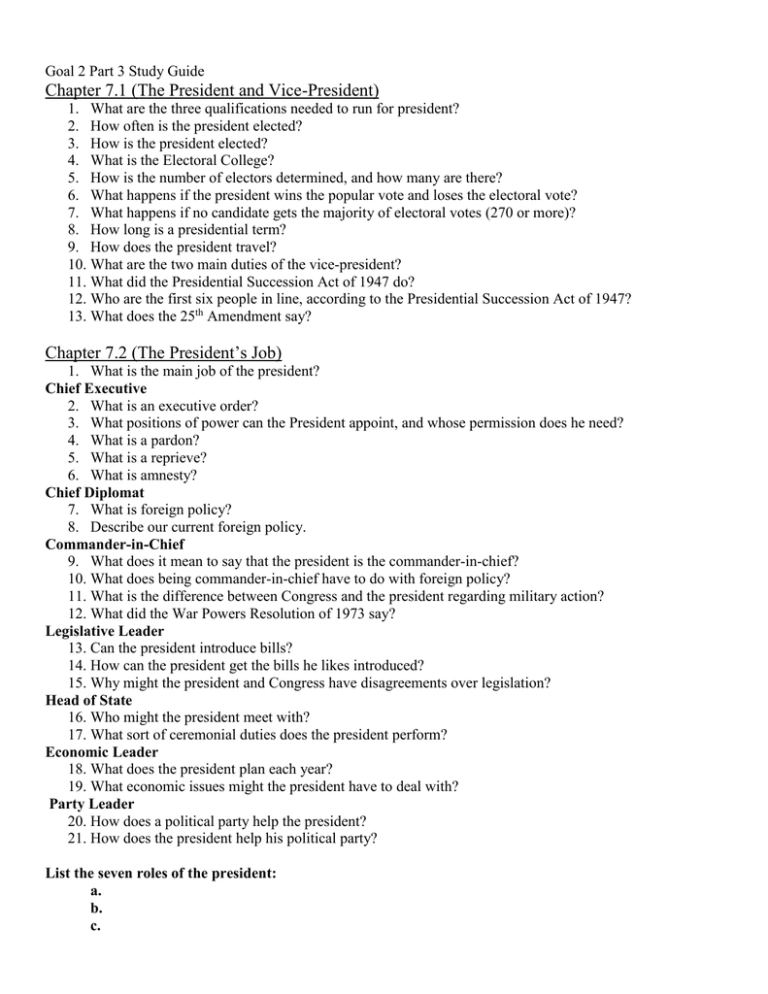
Goal 2 Part 3 Study Guide Chapter 7.1 (The President and Vice-President) 1. What are the three qualifications needed to run for president? 2. How often is the president elected? 3. How is the president elected? 4. What is the Electoral College? 5. How is the number of electors determined, and how many are there? 6. What happens if the president wins the popular vote and loses the electoral vote? 7. What happens if no candidate gets the majority of electoral votes (270 or more)? 8. How long is a presidential term? 9. How does the president travel? 10. What are the two main duties of the vice-president? 11. What did the Presidential Succession Act of 1947 do? 12. Who are the first six people in line, according to the Presidential Succession Act of 1947? 13. What does the 25th Amendment say? Chapter 7.2 (The President’s Job) 1. What is the main job of the president? Chief Executive 2. What is an executive order? 3. What positions of power can the President appoint, and whose permission does he need? 4. What is a pardon? 5. What is a reprieve? 6. What is amnesty? Chief Diplomat 7. What is foreign policy? 8. Describe our current foreign policy. Commander-in-Chief 9. What does it mean to say that the president is the commander-in-chief? 10. What does being commander-in-chief have to do with foreign policy? 11. What is the difference between Congress and the president regarding military action? 12. What did the War Powers Resolution of 1973 say? Legislative Leader 13. Can the president introduce bills? 14. How can the president get the bills he likes introduced? 15. Why might the president and Congress have disagreements over legislation? Head of State 16. Who might the president meet with? 17. What sort of ceremonial duties does the president perform? Economic Leader 18. What does the president plan each year? 19. What economic issues might the president have to deal with? Party Leader 20. How does a political party help the president? 21. How does the president help his political party? List the seven roles of the president: a. b. c. d. e. f. g. Chapter 7.3 (Foreign Policy) 1. List the four goals of American Foreign Policy, and why each is important. a. b. c. d. 2. What is the difference between a treaty and an executive agreement? 3. Where does the United States send ambassadors? 4. Where does the United States NOT send ambassadors? 5. What kinds of foreign aid does the United States provide? 6. What are the two types of trade measures the United States could put on a country? 7. What is a trade sanction? 8. What is an embargo? 9. Name a country we have an embargo over, and explain why. 10. What is the most recent major use of military force as a tool for foreign policy? 11. Which foreign policy goals is the United States trying to accomplish by occupying Iraq? 7.4 (Presidential Advisers and Executive Agencies) 1. 2. 3. 4. 5. 6. 7. What does the Office of Management and Budget do? What does the National Security Council do? What does the Council of Economic Advisers do? What is the Cabinet? What are the leaders of each executive department called? How many executive departments are there? What are the three oldest departments, and what are their heads? a. b. c. 8. What is the youngest department, and who is its head? 9. How many people work in the executive department? 10. What are the three basic jobs of executive departments/agencies? 11. What are the three types of independent agencies? 12. Give an example of an executive agency and explain its purpose. 13. Give an example of a government corporation and explain its purpose. 14. Give an example of a regulatory board/commission and explain its purpose. 15. What is the difference between a political appointee and a civil service worker? 16. What is the difference between a merit system and a spoils system? 17. What kind of system is the civil service system?
